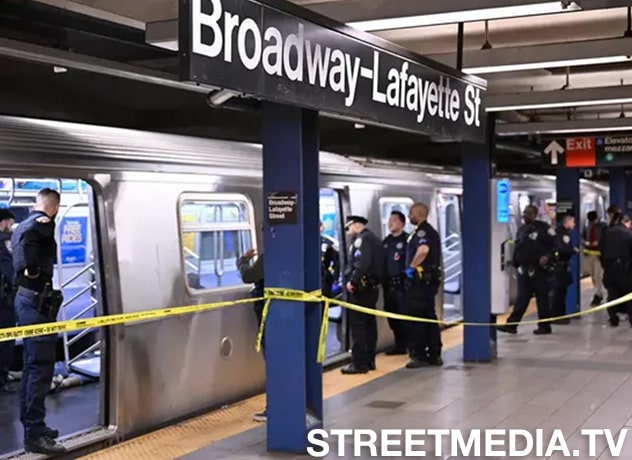Outrage After Homeless Man Dies From Marine’s Chokehold in NYC Subway

In recent times, a disturbing incident has shaken the very core of our society. A viral news story and accompanying video have shed light on the heinous act of a former ex-marine white man who fatally attacked a black homeless man on a subway train in New York City. The motive behind this racially motivated hate crime is alleged to be the marine’s annoyance at being asked for spare change and food. This tragic incident highlights the deep-seated prejudices that still persist in our society and calls for urgent reflection on how we can collectively address these issues. In this blog post, we will delve into the implications of this NYC subway chokehold hate crime, its impact on marginalized communities, and the imperative for social change.
Hate crimes are not isolated events but rather symptomatic of larger societal problems. They are fueled by prejudice, discrimination, and bigotry, targeting individuals based on their race, ethnicity, religion, or other protected characteristics. The incident involving the ex-marine and the homeless man serves as a stark reminder of the insidious nature of racism that permeates our society.
Racially motivated hate crimes like this NYC subway chokehold have a profound impact on marginalized communities. They perpetuate fear, trauma, and a sense of vulnerability among targeted groups. The consequences extend far beyond the immediate victims, causing distress within their communities and eroding trust in law enforcement and social institutions.
The viral nature of this hate crime story demonstrates the power of media in raising awareness and sparking conversations about social injustices. By disseminating the video and news coverage, the incident captured public attention, prompting discussions on systemic racism, white privilege, and the need for accountability.
However, it is crucial to balance the exposure of such incidents with responsible reporting. Media outlets should strive to present a comprehensive view of the issues, highlighting the larger context and underlying factors that contribute to hate crimes. Sensationalized coverage can inadvertently perpetuate stereotypes and reinforce existing biases.
This racially motivated hate crime should serve as a wake-up call for society to address the deep-rooted prejudices that lead to such acts of violence. It is imperative to foster a culture of inclusivity, tolerance, and empathy, starting with education and awareness campaigns that challenge biases and promote understanding.
Law enforcement agencies should prioritize the investigation and prosecution of hate crimes, sending a clear message that these offenses will not be tolerated. Additionally, policymakers must focus on enacting legislation that provides stronger protections for marginalized communities and ensures appropriate punishment for perpetrators of hate crimes.
Furthermore, community engagement is vital in combating hate crimes. Grassroots organizations, religious institutions, and community leaders should work together to promote dialogue, foster relationships, and create safe spaces for marginalized groups. By encouraging empathy and embracing diversity, we can build a society that rejects hate and values the inherent dignity of every individual.
The United States finds itself at a critical juncture in its ongoing struggle with racial divisions. Despite progress made in the past, recent years have witnessed a disheartening increase in racial tensions and growing divisions within the country. These divisions are fueled by a combination of socio-economic disparities, systemic injustices, and the perpetuation of racial stereotypes. As a result, marginalized communities often face disproportionate levels of crime and violence, exacerbating the already palpable racial divide.
One of the key factors contributing to the racial division in America is the persistence of systemic racism. Historically marginalized communities, particularly African Americans, continue to face systemic barriers that limit their opportunities for upward mobility and success. Discrimination in housing, education, employment, and the criminal justice system further perpetuates the cycle of inequality. These disparities not only fuel frustration and resentment but also create an environment ripe for criminal activity and perpetuate a sense of injustice.
The media also plays a significant role in amplifying racial divisions. Sensationalized news coverage, biased reporting, and the dissemination of racial stereotypes can exacerbate tensions and deepen societal divisions. Media platforms, both traditional and social, often focus on crime and violence, disproportionately portraying individuals from marginalized communities as criminals. This narrative further perpetuates stereotypes and fosters a climate of fear, suspicion, and racial profiling.
In recent years, there has been a concerning increase in hate crimes and racially motivated violence. These acts of aggression and discrimination serve as a reflection of the deep-seated racism that still persists within certain segments of society. The rise of extremist ideologies, fueled by online platforms and social media echo chambers, has further fueled these divisions. It is crucial to acknowledge that these incidents are not isolated, but rather indicative of broader societal issues that demand immediate attention and comprehensive solutions.
>> Ex-Marine Kills A Black Homeless Man In A NYC Subway Chokehold!
Addressing the growing racial divide and crime rates requires a multi-faceted approach. It starts with recognizing the deep-rooted systemic issues that perpetuate inequality and discrimination. Policymakers must prioritize criminal justice reform, focusing on fair sentencing, unbiased policing practices, and rehabilitation rather than punishment. Additionally, investing in education, job training, and economic opportunities in marginalized communities can help break the cycle of poverty and crime.
Building bridges and fostering dialogue is essential in overcoming racial divisions. Promoting understanding and empathy among different racial and ethnic groups is crucial for creating a more inclusive society. Encouraging open conversations, community engagement, and cultural exchange programs can help break down stereotypes and build trust. It is essential to cultivate an environment where diversity is celebrated and everyone feels valued and respected.
Ultimately, combating racial division and crime rates requires a collective effort from all members of society. It necessitates acknowledging the inherent worth and dignity of every individual, regardless of their race or ethnicity. By actively challenging our own biases, advocating for justice, and promoting equality, we can strive to create a society that is truly united, where everyone has an equal opportunity to thrive and feel safe.
The racially motivated hate crime involving a former ex-marine and a black homeless man in a NYC subway chokehold is a stark reminder that bigotry and racism continue to plague our society. It is our collective responsibility to confront these deep-rooted prejudices and work towards a more inclusive and equitable future. By raising awareness, promoting dialogue, and advocating for systemic change, we can dismantle the structures that enable hate crimes to persist. Let us stand together, united in our commitment to creating a world free from discrimination and violence.



